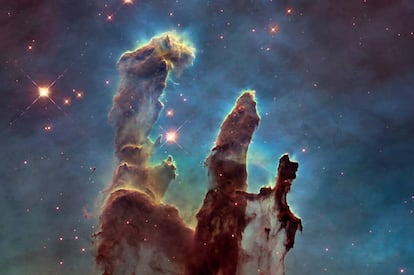The universe is dying
More than two decades ago, the Hubble Space Telescope began to show us the fate of the stars, galaxies and, by extension, the cosmos, which is in irreversible decline

The universe is dying. One or more things have been conspiring to kill it. And our galaxy, the Milky Way, will not be spared. The process is nothing new, it started a long time ago, but it seems to be irreversible. It’s the end of the world as we know it, to paraphrase the REM song. We are heading – very slowly by the time scales humanity works by, but inexorably – to the waning of our universe, which will pave the way for a completely different one, which will be extremely dark and hostile by our standards.
The universe is 14 billion years old. Today we know that galaxies already existed when the universe was just 400 million years old – or 3% of its current age. Since then, galaxies and the stars that form them have dominated the cosmos for practically its entire existence. The Milky Way, a fairly normal galaxy that contains about 100 billion stars, today forms a star like the Sun every year. Is that a little or a lot?
In astrophysics, and physics in general, and it could be said in life in general, the best way to tackle a problem is to first scribble it on a napkin, a simple operation that nonetheless often contains plenty of knowledge and understanding. More complicated equations can be carried out later, but a first estimation of what a problem poses always helps to solve it. For example, without the need of understanding physics, if we want to know how long we can expect to be in a car, at an average speed of 100 miles an hour, on a 360-mile trip, we divide one amount by the other and get 3.6 hours. If we apply that to the Milky Way using the napkin trick, at the current rate of one Sun-like star a year, it would take 100 billion years to form all the stars in our galaxy. But the universe is much younger than that. A simple calculation is telling us something very important about the universe.
The Milky Way today forms a star like the Sun every year. Is that a little or a lot?
In two seconds with a simple division, we can conclude that the history of our home must have been much more interesting in the past. In fact, most of the galaxies surrounding us had their golden age some time ago. In the case of the biggest galaxies that we are aware of, such as the massive Messier 87, almost 100 times bigger than the Milky Way, more than 90% of their stars were formed in the first 20% of the universe’s life, and since then, Messier 87 has been fairly inactive, or dead as astrophysicists say. In human terms, taking an 80-year-old as an analogy, everything that galaxy did took place before it was 17; it lived fast and died young, at least in terms of the stars that it formed.
If we take into account not one or two galaxies but every one that exists – and here is the crux of an extra-galactic astrophysicist’s day: thinking about all of the galaxies in existence despite never having seen them all or wondering if the universe was infinite – we can say that the universe was much more active nine billion years ago than it is today, and that it was a lot more interesting when it was half as old as it is now. During that time, the universe formed stars 20 times more quickly than it does now and there was a proliferation of supermassive black holes that got bigger and bigger as they swallowed gases, stars and planets and whatever else was in front of them. It may be that these monsters are responsible for killing galaxies, or that they poison them and condemn them to a slow death. The fact remains that since that time the cosmic activity of forming stars and galaxies has continued to decline. In other words, galaxies have long since ceased to be what they once were, their activity is in inexorable decline and they no longer form an abundance of stars as they did in the past, and as such, they are speeding toward extinction.
We only became aware of this galactic crisis 25 years ago, when the Hubble Space Telescope revealed it, and since then we have been studying the details of this galacticide minutely. Now, with the imminent launch of the James Webb Space Telescope, we will be able to continue the investigation into why the universe is dying, and seek out the culprit or culprits.
I was perhaps carried away by my anthropocentrism when I said the universe is dying. We are witnessing something similar with climate change, which will not finish off the planet but will instead finish off our lives as we know them, although it is to be hoped we react in time to prevent this. The universe will also not cease to exist because the stars and galaxies disappear. Put simply, something is finishing them off. Perhaps supermassive black holes, or dark energy. The fact is, like in The NeverEnding Story, the Nothing is sweeping everything away and we have no Atreyu or Bastian to stop it. The light is going out. The age of the stars will come to an end and a new universe will come into being, a different, colder, darker one dominated by energies that will seem strange to us and that will be more hostile to human life, which by then will either have ceased to exist or will have evolved enormously by that time.
Tu suscripción se está usando en otro dispositivo
¿Quieres añadir otro usuario a tu suscripción?
Si continúas leyendo en este dispositivo, no se podrá leer en el otro.
FlechaTu suscripción se está usando en otro dispositivo y solo puedes acceder a EL PAÍS desde un dispositivo a la vez.
Si quieres compartir tu cuenta, cambia tu suscripción a la modalidad Premium, así podrás añadir otro usuario. Cada uno accederá con su propia cuenta de email, lo que os permitirá personalizar vuestra experiencia en EL PAÍS.
¿Tienes una suscripción de empresa? Accede aquí para contratar más cuentas.
En el caso de no saber quién está usando tu cuenta, te recomendamos cambiar tu contraseña aquí.
Si decides continuar compartiendo tu cuenta, este mensaje se mostrará en tu dispositivo y en el de la otra persona que está usando tu cuenta de forma indefinida, afectando a tu experiencia de lectura. Puedes consultar aquí los términos y condiciones de la suscripción digital.









































